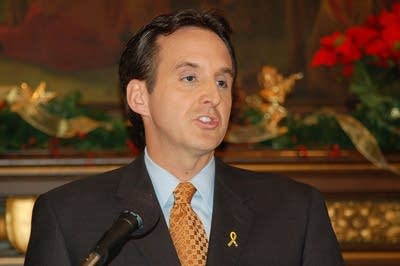Budget shortfall at $373 million
Go Deeper.
Create an account or log in to save stories.
Like this?
Thanks for liking this story! We have added it to a list of your favorite stories.

State Economist Tom Stinson says there are four major reasons why the state budget is projected to run in the red. They are high energy prices, a slowdown in the housing market, a credit crunch and that Minnesota's economy is not keeping up with the national economy.
"That means that fewer jobs will be added. It means there will be slower growth in income. It means there will be slower growth in sales and slower growth in corporate profits or even a decline in corporate profits and those are all items that we tax."
Minnesota is six months into its two year budget. State law requires the budget to be balanced by June of 2009. Gov. Pawlenty said the deficit is manageable, noting that it represents just 1 percent of the two year budget.

"We have options and it is not time for hysteria, it's time for thoughtful and strategic thinking about how to proceed."
Turn Up Your Support
MPR News helps you turn down the noise and build shared understanding. Turn up your support for this public resource and keep trusted journalism accessible to all.
The governor says he doesn't think it's necessary to cut spending or raise taxes to balance the budget. He says using money in reserve accounts will cover it.
Pawlenty says he's also willing to close a tax exemption for some corporations that operate overseas. That's an idea many Democrats have been suggesting but Pawlenty says the money should be targeted for tax cuts. His ideas include direct property tax relief for homeowners, income tax cuts for middle income earners, research and development credits or tax cuts for veterans.
Democrats want to use the money to erase most of the projected deficit. Sen.Tom Bakk, DFL-Cook, says the governor should call a special session in December so lawmakers can get to work on the tax code right away.
He says closing the so-called tax loophole in December would allow the Legislature to capture $244 million to erase the budget deficit and that waiting until lawmakers return in February means the figure will be cut in half.
"We're clearly not growing our way out if it. There's going to be some very tough decisions to be made this next legislative session. I don't think we should lose the opportunity to close the corporate tax loopholes. For my part, it would be a lot easier to do that if the governor allowed to collect that money for tax year '07."

Democrats have been talking for months about finding more money for schools, cities and people without health insurance. They appear to be unwilling to give up those plans despite the gloomy forecast.
They preferred to focus on the state's relatively weak job numbers. House Speaker Margaret Kelliher, DFL-Minneapolis, said passing a bonding bill in a special session will help put people to work on projects like the proposed convention center in Duluth.
"We can make sure that we are doing our part to fire up this economy. Job creation will be our highest priority."
The governor says he's willing to pass a bonding bill but is more inclined to wait until the legislative session begins in February. He disputed the claim that the bonding bill would spur economic development.
"Having that approach is not the answer. The answer is not to stimulate the economy by building government buildings. The answer is to stimulate the economy by putting more money in the pockets of hard working Minnesotans and their families."
Pawlenty said the forecast is also a signal that the Legislature and interest groups should lower their expectations for spending increases in the upcoming session. House Minority Leader Marty Seifert, R-Marshall, backs Pawlenty's fiscal restraint. He said lawmakers and groups should prepare for a lean session.
"I would not be planning on anything. If anything they should be planning on less. This is a message from top to bottom - counties, cities, school districts everybody is going to have to hold the line on their contracts, employee wages. Everything. It's going to have to be a hold the line year."
But some groups, including the public employee union AFSCME, have already begun lobbying for what they call fairer taxes for investments in education, health care and transportation.



